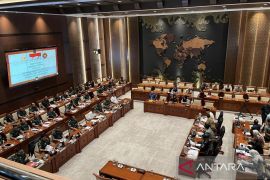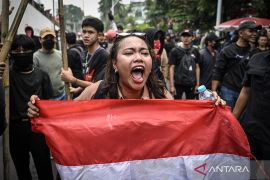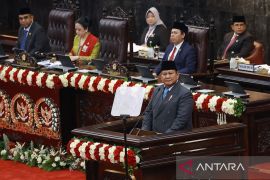"Bank Mandiri is a healthy bank. It needs capital injection not because it is unhealthy but it needs more capital for expansion," Augustinus said.
Capital injection should be given when it performs well that it has greater strength for expansion including abroad, he said here on Thursday.
"Bank Mandiri has good financial indicators . It meets all financial ratios as required by Bank Indonesia. This is an opportunity for the Parliament and the government to strengthen state banks," he said.
Based on data from Bank Indonesia, the government shares in Bank Mandiri is only 60 percent, he said, adding the government control of the countrys largest bank could be reduced to as low as 51 percent.
If the Parliament and the government failed to back up the plan to strengthen the capital of state banks, foreign banks could expand their banking market and increase domination in the country, he said.
On Thursday, the Commission XI of the Parliament postponed decision on proposed capital injection for 35 state companies including Bank Mandiri .
The government proposed a capital injection of Rp72 trillion for the 35 state companies including Rp39.8 trillion for companies in infrastructure sector, Rp14.8 trillion for those in natural resources and Rp9trillion in banking sector.
Bank Mandiri alone was to have a share of Rp5.6 trillion of the capital injection.
Chairman of Commission XI Fadel Muhammad said the commission would approve only capital injection proposal for 10 state companies.
"We want more time to consider approval for capital injection for other state companies," Fadel said on the sidelines of a working between the Commission and Finance Minister Bambang Brodjonegoro.
He said , there are indications of misuse of Rp3.1 trillion in fund by 14 of the 35 state companies and they have not clarified the finding by the Supreme Audit Board (BPK).
A report said by December 2013 , assets of state banks declined in proportion to 36.7 percent from 49.4 percent of the total assets of banks in the country in 1999. Meanwhile the assets of private banks and foreign joint venture banks grew from 11.6 percent to 36.5 percent.
Credits of state banks also shrank in proportion from 53.2 percent to 36.6 percent while those of private banks including foreign joint venture banks rose 20.3 percent to 35.1 percent.
The expansion of foreign banks is also reflected in their domination of the number of bank branches in Indonesia. Foreign bank branch offices make up 43.4 percent of the number of all bank branches in Indonesia.
There are 17,326 bank branches in Indonesia including 9,344 units of Indonesian banks , 7,522 units of foreign banks including CIMB Niaga, Permata, Panin, Danamon, BII, Ekonomi, Hana, Bank Woori Saudara, ICB Bumiputera, ICBC, QNB Kesawan, Mayapada, BNP Parahyangan, OCBC NISP, State Bank of India, Bank UOB Buana and BTPN.
Meanwhile, former secretary of the state minister for state enterprise Said Didu said state banks would need large additional capital to be able to finance big projects of the government especially infrastructure projects.
"State lenders would have no enough fund available if PLN (state power utility company) and Pertamina (state oil company) need fund for their projects," Didu said.
The government have big plan for infrastructure development to facilitate economic growth
With state banks short of capital it is feared foreign banks would gain greater market share to exploit the huge credit market potential in Indonesia, he said.
"State banks will be in greater difficulty in market competition," he said .
Didu said he wanted to warn the Parliament that rejection of capital injection for Bank Mandiri would allow foreign banks to take over the financing role in the country.
State banks still have limited funds to finance development projects especially infrastructure projects, he said.
He called on the government to maintain the spirit to have strong state banks in facing the implementation of ASEAN Economic Community (AEC) by the end of this year.
Under AEC, most of the tariff barriers among the 10-member countries would be abolished.
He said with the capital injection Bank Mandiri is expected to emerge as a Qualified Asean Bank (QAB).
Malaysia and Singapore already have banks with the category of QAB that would be free to expand to any country in ASEAN without any restriction, Didu said.
Meanwhile, Head of Strategic Research and Analysis Network of Market Investor (NMI) Reagy Sukmana said rejection of capital injection for Bank Mandiri will leave Indonesia a minor player in banking business in the region.
"Our state companies are not only foreign exchange earners but also agent of development," Reagy said.
He said he is optimistic Bank Mandiri, as the countrys largest lender, could play a greater role in financing infrastructure projects to accelerate economic development.
"The Parliament members should be more visionary. If they fear misuse of the fund, they could tighten control, instead of rejecting the capital injection," he said.
(H-ASG)
Editor: Ella Syafputri
Copyright © ANTARA 2015










